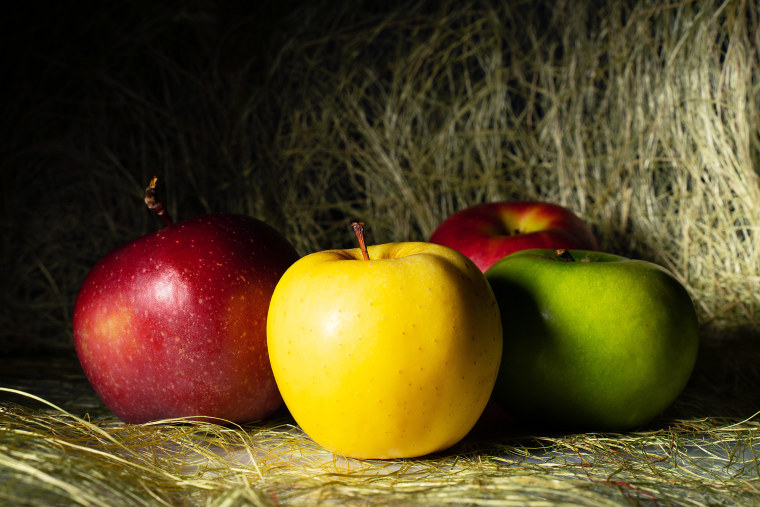Ever heard the adage "an apple a day keeps the doctor away?" It turns out there's a little bit of truth to it. Apples are low in calories and fat — and contain filling fiber that can help stabilize blood sugar, aid digestion in and keep you fuller longer. And it's a perfectly portable snack!
According to data from the US Apple Association, there will be more than 10.7 billion pounds of apples produced in the United States during the 2022-2023 growing season. Whether you get your apples from the farm, farmer’s market or supermarket, it’s worth adding this crispy fruit to your basket. Not only are apples bursting with nutrition, they are also a healthy standalone snack or a versatile ingredient for salads, main dishes and desserts.
Here are some of the best reasons to add a bushel of apples to your shopping list and tasty ways to eat “an apple a day.”
Apple nutrition facts
One medium apple has:
- 95 calories
- 0.5 grams protein
- 0 grams fat
- 25 grams carbohydrates
- 4 grams fiber (16% daily value (DV))
- 8 milligrams vitamin C (11% DV)
Most of the beneficial compounds in apples come from polyphenols (plant compounds), which aren’t actually listed on nutrition facts label.
The health benefits of apples
The old adage about an apple a day being the antidote to basically everything may have some validity. Research on apples points to their benefits for heart health, diabetes, cancer, gut health, weight loss and inflammation. “Apples are high in antioxidants, fiber, vitamin C and low in calories,” said Sarah Schlichter, registered dietitian nutritionist and owner of Bucket List Tummy.
A recent meta-analysis described apples as having “medicinal value,” citing research that shows the protective properties of eating apples for various chronic diseases. As a matter of fact, a meta-analyses of over forty studies found that eating apples was associated with a reduced cancer risk. The authors hypothesize that the polyphenols in the apples act as antioxidants, which may inhibit tumor multiplication and growth.
Some of the most impressive research surrounding apples is on their heart health benefits. A recent randomized controlled trial in the The American Journal of Clinical Nutrition looked at the effects of eating one apple a day on inflammatory biomarkers associated with cardiovascular disease in an obese population. The researchers found that just one apple per day for six weeks may lessen obesity-related inflammation that is normally associated with cardiovascular disease, even without any weight loss.
What’s more, a second randomized controlled trial in The American Journal of Clinical Nutrition found that eating two apples per day for eight weeks reduces blood cholesterol in adults with high cholesterol. Again, the researchers attribute these results to the polyphenols in the fruit.
Another point for the polyphenol column goes to their role in gut health. Research on the polyphenols in apples suggest that they may play a positive role in gut microbial activity, but more research is needed.
Beyond the polyphenols, Schlichter said the fiber in the apples contributes to their healthfulness. “Eating enough fiber can be great for balancing blood-sugar levels, managing satiety and aiding in digestion," she said. Data from a research review in the Journal of the American College of Nutrition found that eating apples is also associated with weight loss.
Are there drawbacks to eating apples?
Apples contain natural sugars, mainly fructose, sucrose and glucose. One medium apple has 6 grams of fructose, 2 grams of sucrose and 2 grams of glucose. “Many people may not know that the fructose in apples may cause issues for those with fructose intolerance,” said Schlichter. “Since apples contain (certain carbohydrates called) FODMAPS, which are fermentable fibers that cause digestive issues, some people may experience gas or abdominal pain after eating apples,” she adds.
These digestive issues are not the case for everyone though, so many people are perfectly fine incorporating apples into their diet.
3 fun facts about apples
Beyond their impressive nutrient profile, here are a few other fun reasons to eat apples.
1. There are more than 7,500 varieties grown worldwide
Although you may stick to gala or honeycrisp, “there are 7,500 varieties of apples grown worldwide and it’s the second most consumed fruit behind bananas,” according to Schlichter. Around 2,500 varieties are grown in the United States alone.
The Gala, Fuji, Red Delicious, Granny Smith, Honeycrisp, McIntosh and Pink Lady are some of the most common varieties in the US. Some are more crisp and sweet, like the Honeycrisp and Gala, while others are more tart, like the Granny Smith.
2. The fiber is in the skin
There is a reason the skin of an apple is a bit tough: It houses the majority of the fiber in the fruit. One medium apple with skin has 4 grams of fiber, but remove that skin and you cut the fiber in half to just 2 grams. Science also suggests that the beneficial antioxidant properties of apples come from the skin. In other words, it’s best to snack on your apples whole. Leave the skin intact, unless you really need to remove it for a recipe like apple pie.
3. Apples contain pectin, a plant-based alternative to gelatin
The soluble fiber in apples is called pectin. This type of fiber is a starch that is found in the cell walls of certain fruits and vegetables. After it’s extracted from the plant, it’s sold in liquid or powder form.
Pectin is used as a natural thickener for jellies or jams, especially with fruits that are not high in pectin, like berries. Since pectin comes from plants, it’s a vegan alternative to gelatin.
Healthy apple recipes and snack ideas
Apples are incredibly versatile and can fit perfectly into any meal of the day. There’s really two ways to go with apple dishes, either sweet or savory. Both are equally delicious. Here are some simple ways to use apples in a variety of ways.
Breakfast: “I love throwing diced apples into baked oats, overnight oats or yogurt parfaits,” said Schlichter.
Snacks: “When enjoying with my kids, we’ll often make 'apple nachos,' and slice apples into a flat 'chip' shape and then top with greek yogurt, peanut butter, sprinkles and chia seeds,” said Schlichter.
Side Dishes: The sweet and crunchiness of apples makes them the perfect ingredient for a simple slaw or an addition to a leafy green fall salad.
Mains: Apples pair really well with savory dishes, like an herbed pork tenderloin or salmon tacos.
Desserts: You can’t go wrong with a decadent apple crisp, apple pie or an elevated apple tart with caramel sauce.

